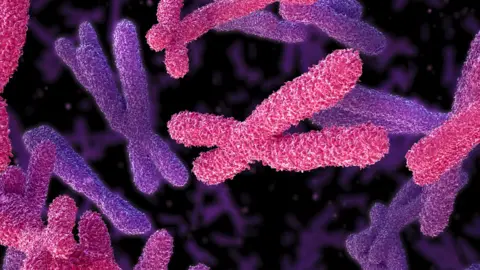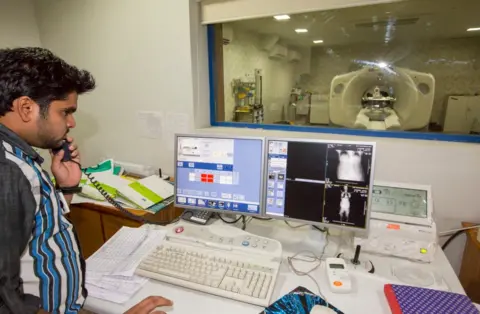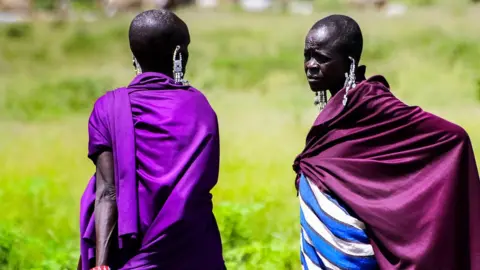The power of a billion: India's genomics revolution
 Getty Images
Getty ImagesCould an effort to gather genetic data from its population of one billion people help India take the lead in advanced healthcare?
India is the land of inventors and industry, spices and spirituality - and 1.3 billion human genomes. But although the subcontinent contributes around 20% of the world's population, the DNA sequences of its people make up around 0.2% of global genetic databases.
In a similar vein, 81% of the world's genomic information has been collected from people with European ancestry. Still, this is an improvement from a staggering 96% back in 2009.
At the same time, there's a growing interest in developing new, more effective therapies tailored to an individual's genetic makeup - an idea known as precision or personalised medicine.
Missing out on mapping worldwide genetic diversity is a big mistake, according to Sumit Jamuar, chief executive of Global Gene Corp.
It's a company aiming to democratise healthcare by capturing anonymised genetic data from populations around the world and share it with the global community of academic and pharmaceutical industry researchers. It will start by focusing on populations in South Asia.
 SCIENCE PHOTO LIBRARY
SCIENCE PHOTO LIBRARY"Healthcare is broken," Mr Jamuar says. "We spend $1 trillion on drugs every year, of which 40% or more are deemed to be ineffective. That's $400bn wasted. What's more, the burden on healthcare systems is only going to increase.
"We realised that with the power and possibility of genomics and precision medicine, you can change the health outcome for any individual and allow them to have not just a longer but a better quality of life. What was lacking was genomic data to realise that promise, and that's what we've set out to achieve."
As deaths from infectious diseases fall, particularly in the developing world, there's a rise in chronic illnesses such as cancer, heart disease and diabetes - something the World Health Organization (WHO) has described as a "slow-motion catastrophe".
Treatments for these conditions are moving away from "one size fits all", becoming more precisely targeted to an individual's genetic makeup. Yet these drugs are currently designed and tested on the basis of predominantly "pale, stale and male" genomic information, and may not work for people with regional variations in their DNA.
 Science Photo Library
Science Photo LibraryMr Jamuar believes the key to fixing this problem lies in gathering genetic data - as much of it as possible - along with harnessing the technical tools to analyse and share it.
And with the cost of genome sequencing falling rapidly, with quotes for the $1,000 genome dropping to just $100 within a year or two, it's definitely doable.
"If we take the example of GPS technology, it used to just provide longitude and latitude. Now we have Google maps and that has changed everything," he explains.
"It allows us not to focus on what goes on underneath the technology, but how we can use it to navigate our way round the world. What we want to do is create a high-fidelity genomic map of the world. And instead of looking for things like restaurants or traffic in a city, we can look at mutations or diseases in different areas."
Right now, Global Gene Corp is focusing its genomic firepower on India, although it has plans to expand into Africa and other parts of Asia. Other initiatives are also springing up to plug the global data gap.
For example, the Wellcome Trust Sanger Institute'sAfrican Genome Variation Project is looking in depth at 2.5 million genetic variations in 100 people from more than 10 ethnic groups across sub-Saharan Africa.
 Getty Images
Getty ImagesSimilarly, consumer genetics firm 23andMe recently launched a dedicated African Genetics Project. These populations are woefully under-represented in today's genomic databases, yet make up a significant and widely-dispersed fraction of the world's inhabitants, including many millions of African Americans.
At Stanford University in California, Prof Carlos Bustamante's Population Genomics and Global Health team is focusing on people from Mexico, South America, and the Caribbean. And in 2015, South Korea launched its own genomics project, initially aiming for 10,000 participants but planning to expand in the future.
But it's not as simple as just sequencing a load of people's genomes from different countries and sticking it all in a big database. At the relatively trivial end, genetic data gathered by different teams around the world may not be in the same format (akin to the old Mac versus PC incompatibility problem).
The Global Alliance for Genomics and Health - an international coalition formed to enable DNA data sharing - highlights the challenge of harmonising genomic data across countries that may have very different legal frameworks for gathering and managing data.
Privacy concern
Then there's the question of storage: a single human genome contains roughly three gigabytes of data, and it quickly adds up. With plans in place to sequence tens or even hundreds of thousands of individuals around the world, keeping all this information safe and secure is a growing issue.
If these problems can be solved and researchers start filling databases with genetic information from under-represented countries, the potential impact is huge.
It costs around a billion dollars to develop a single new drug, but 95 out of every 100 promising candidates never make it to the end of the journey. Treatments that seem promising in identikit animals or cells in the lab often falter when faced with the genetically complex reality of human patients.
Understanding more about the impact of genetic variations on the function of potential drugs - or identifying population-specific targets - could help to cut the cost of failure in the pharmaceutical industry's development pathway. And purely from a business angle, more genomes mean more customers for novel treatments.
Most importantly, providing more tailored healthcare solutions for the diverse and growing global population has the potential to save lives on a grand scale.
"This is the future," says Mr Jamuar. "Just imagine if we can change the health outcome for every individual - that is a phenomenal promise."
